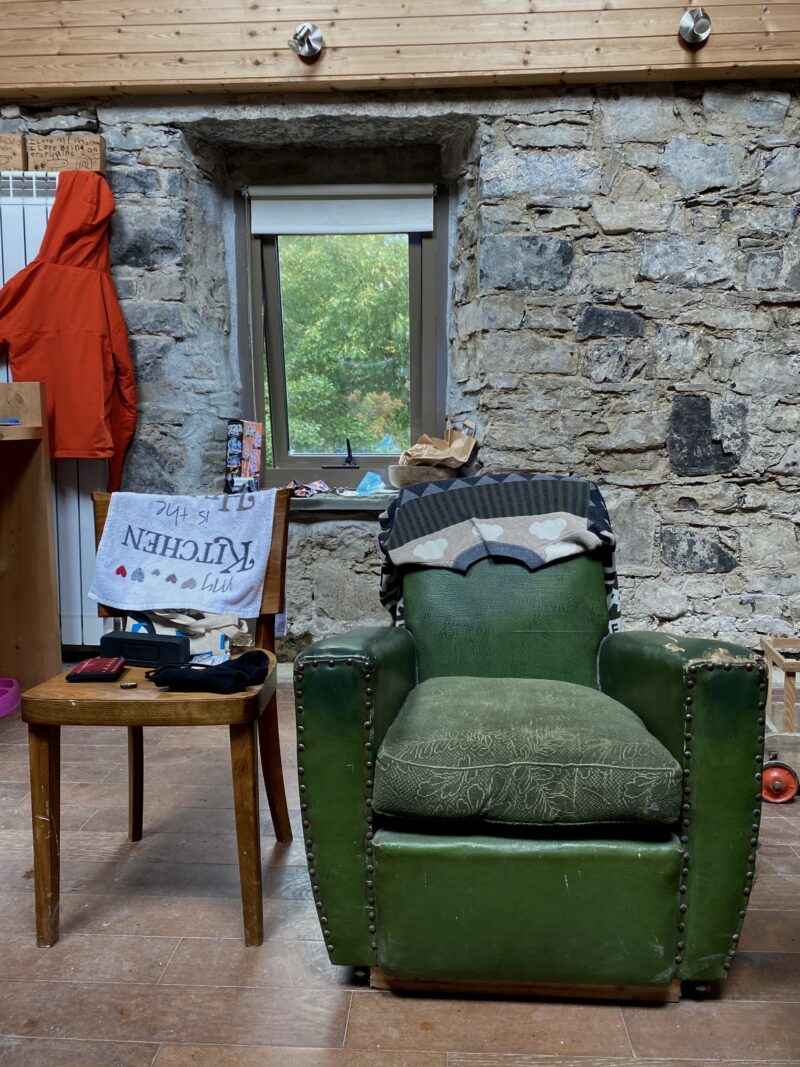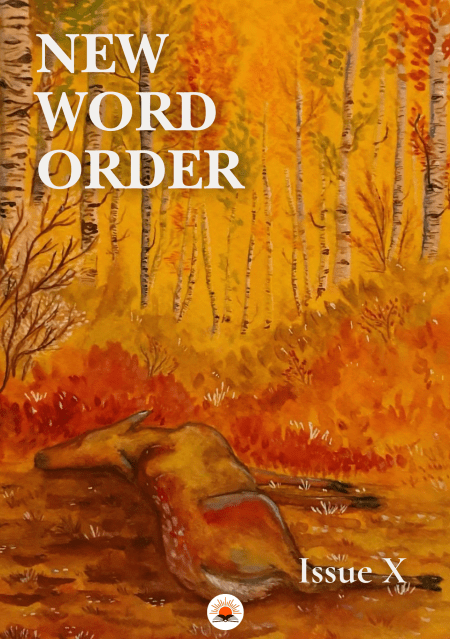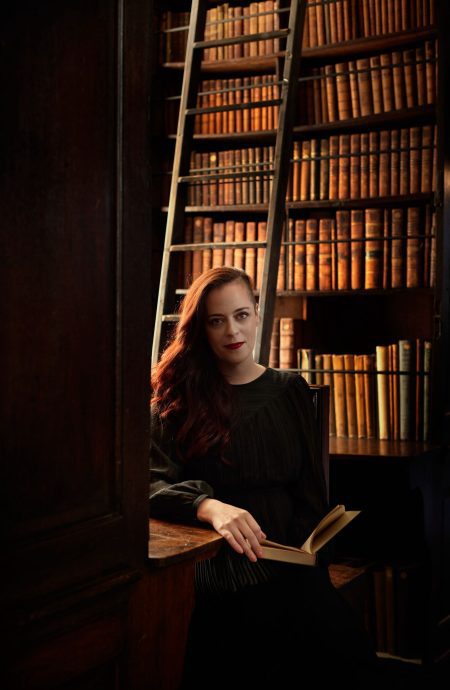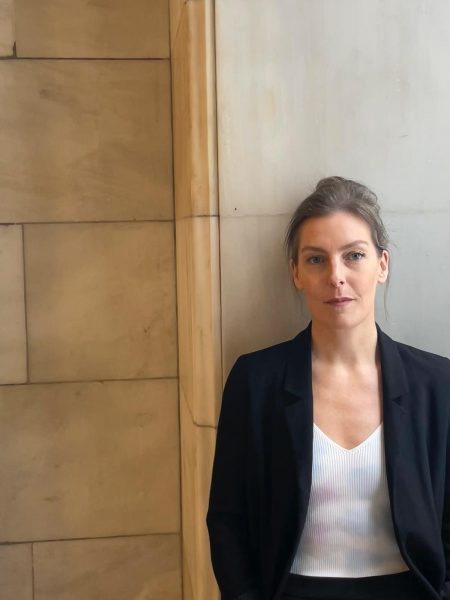{by Éimhín O’Connor}
It woke through her fingertips. She touched in beats of four but not at first. Then she pressed down once quickly. It sounded like the full stop at the end of a sentence. She pressed down again, longer this time and the sound seeped through the air like a drop of red wine on a white tablecloth, humming it’s new life through the walls. This morning she woke with a fatigue of lost thoughts, only able to think through the piano keys. The November sunlight had gone too far this morning and seared through her eyes and bleached into her when she drew the curtains. The house was empty and there was no one to argue with her the reality of this feeling. The house was empty.
Until she heard a cry. When she sighed her chest sank and her shoulders curled forward. She begrudgingly turned her head from the piano and drew herself away. The wailing hit soft peaks in between moments that sounded like small, sad, laughter. “Oh, oh oh oh.” Her voice was deep and gentle; “oh baby, no.” She leaned over the cot and smoothed her hands under the baby and lifted him into her cradled arms. She swayed in a firm but careful rhythm as the cries faded into whimpers and then faded into rest. He was tiny. His head fit exactly in her palm and she took a minute. She took a minute to darling over her son; her beautiful son. The little lump of warmth in her arms. His own arms splayed suddenly. “Such a big stretch for a little man”, she laughed to herself. As she went by the dresser she chose a charming outfit for a 2-month-old. She walked with him through the shadowy, blue hall. The dark floorboards creaking as she stepped, going down to the sitting room. She caught sight of herself in the mirror as she passed, her hair in what she couldn’t even call a ponytail anymore, the clothes she slept in hanging loose. She stopped for half a moment to look at her bare, pale face. She was “too young to look so ugh” she thought to herself. And then looked at the overall frame before her, with the little one clinging to her. She didn’t let herself dwell any longer before moving on.
She came round the side of the sofa and put him lying on his back while she sat down beside him. He babbled then flailed his legs and arched his neck. Big, deep blue eyes blinking slowly open, bewildered by the back wall of the room. Changing him started with taking off his socks, and working up. She wiped him clean as he began to cry once again, his kicking surprisingly strong. As she pulled on his new socks, a thought drifted across her mind; a thought of November last year.
She remembered little soaked feet. She remembered the stampede of little shoes running out over the grass to her, a chorus of little voices, followed by the clap sound of high fives and she pretended they stung so hard because they were “so strong”. She thought about the big brown eyes, and how happy they were to see her, even in the cold of the morning. The hum of the motorway near by and wide blue signs for Calais and Dunkirk just about visible through the branches. In the valley, or field, or forest, or something in between, tents were in every dip of the ground or between any nest of trees. She remembered the police van driving in to watch over the children as they played. She remembered the officer at the wheel’s blank face as he made sure they knew he was watching. As he made sure that not for a moment could they forget that they were refugees, not children. She held his socks in her hands and was reminded of organising the warehouse full of donations, a lot of which were clothes the same size as these; a thought she hadn’t linked before.
She thought about the man, coming up to them as they brought out the food in the evening to ask if they had a sleeping bag to spare. The sickness of not being able to help him. Having to say no because the warehouse wasn’t giving out sleeping bags right now. Not because the warehouse didn’t have them but as giving them out when there wasn’t enough to go round would cause “more harm than good”, and she knew they were right.
She remembered what it meant to the parents, to see their kids get to play in a workshop. They didn’t have school, but at least there was something. She understood it then, more than she did now. She cradled him in her arms again, but this time her own eyes watered. She tapped his nose lightly. She wrapped his fingers round her thumb; his fingernails were the size of pinheads. Like all mothers would, she would do anything to keep him safe. She thought of every mother she’d met who had no other choice but to bring their family across the water on boats that didn’t have room for them. Every mother who had to see their family living in a tent, in the winter. Then to have Police come and slash it open before night, because somehow, even in the middle of nowhere, your family still takes up too much room. How do you keep going? She held her son in her arms and she thought of the mother’s she met who couldn’t do the same. Her skull felt like thick wax as she imagined the pain. She thought of each face and the brown eyes lit golden and squinting in the dawn and they lit a flame of guilt in her head. She remembered watching the police wake them, telling them to move on, again. Her head had felt heavy then as well, as she looked on, unable to do anything. The morning dew bringing an extra dampness as each little body moved slowly between breathing out shivering, clouds of fog. The house was empty. She sat with him in the quiet, loving him in her arms as she felt like she was melting.
She didn’t have the heart to watch the news this week. She couldn’t listen to anchormen speak about thirty-nine people dying in the back of a truck in Essex because when she heard them, she heard Muhammad’s father speak about England like an oasis. Waiting three years to see his wife and daughter. She couldn’t hear them say the word crisis in monotone anymore. Listen to them speaking of nationalities as if another species, listen to them say that their “prayers are with” groups of people that they never tried to know. Because she saw their smiles. She saw their brown eyes. She heard Muhammad, seven years old, say that he will hide with the pigs and the sheep before he gets to see his sister. She didn’t know if their truck made it through. She’ll never know if they made it through.
She remembered queuing back for the ferry from Calais and with fifteen or so lorries in line in front of them and Laura saying that at least two of them had people hiding on them. She remembered making jokes to pass the time as they sat in traffic at border control on the way home to Dover, laughing at nothing and then being told it wasn’t the time, because that traffic could mean that someone had been found. She thought about how privileged she’d been, as a child and as a mother. She felt her own luck sink into her like a sin. She needed to stop thinking again. She walked back through the hall to the piano and sat. Him, nestled in her lap. She played a note, and it breathed through the room again, higher this time. With one hand she played a simple version of a song her mother used to sing, slowly. In the other his head leaned in the crease of her arm. The music humming through everything, and the moment held itself still to listen.
She thought about how things had changed in the last two months. About how of course everything was new for her little man, but how it felt like- She didn’t know. She didn’t know what it felt like, but things were different. As if being alive felt more intimate. When he came into the world something unconditional nestled in her heart. Maternal instinct? Not exactly. Something deeper than that, beyond that. She understood what her mother felt, and her grandmother, and the mother before that. She was a root and a petal stemmed from her own arms. As he opened his eyes, his face bloomed curiously at the sound of the piano.
She watched passers by through the window that looked over the front garden. The child coughed, and gave himself a shock. She stroked his head, the little hair he had even softer than his skin. And pressed again on the piano to sooth him, as if awoken slowly from its silence softly echoing from note to note. She thanked God that they were where they were when she thought of the chesty, sharp coughs she had heard as they played, soaked in that morning dew. She felt guilty once again. It felt like a betrayal to thank a God which allowed such a thing to happen. To thank a God who tended her but watched the wildflowers freeze. She remembered the young pregnant woman, heavily pregnant woman, in the grass last year. She watched the armed guard wake her and tell her to move on. She remembered by the time she herself had hit four months pregnant how much she had complained about her own mattress.
She looked down to the little one, a shiver of pain ran through her. She looked out the window and the sky looked lost, that same light that had bleached her had calmed into a shade of dull clearness, not knowing what to do with itself. And it hurt to look at him under it. The more she thought about the future the more hopeless it seemed. Her mind repeated awful mantras.
Life isn’t kind. God doesn’t watch over you.
How it was such a lonely feeling knowing about the pain that you can’t heal. The people that you can’t help. Thinking about these things made her eyes close and her head tired. She felt a glaze of cold down her spine and the back of her arms. She loved him. She loved him more than anything. She wanted him to feel that and know that. Only ever know that. So many lives; seen as numbers, each one of the millions in crisis. Each one of those millions had the same eyes that she’d seen, same mouths that needed to be fed, chests that needed to be wrapped up against the cold, legs that so badly needed rest, voices with laughter that needed to be given a chance. Her memories grew like mould on her lungs. They were more than memories; she knew that they weren’t over. It was like a nightmare, with no waking up, only walking away. She stepped out of that world when she found herself pregnant and now it was the two of them in that empty house. She continued to play her mother’s song, single-handedly.
As she counted the beats, it made her think of heartbeats. It was odd, she thought. She remembered hearing her son’s heartbeat at an ultrasound for the first time. How the hospital corridors were full of sunlight that day. Compared to the year before, the same sun, but different corridors, in harsher light. She remembered hearing her mother’s heartbeat slow to a stop, as she held a hand that lost its grip. She missed her everyday. Such different feelings at the start and end of the same sound. It made her wonder. What if heartbeats were as loud as voices? Maybe then we’d be conscious of how much they mean. Police would look into golden eyes and hear a harmony with their own. And the millions of them could be a chorus, or heard on the dark nights like hard rain. And it would be finally something your conscience can’t ignore. But for now she only heard the piano, and the song she’d been taught so many years ago. In years from now she knew if nothing else, he’d think of this like a heartbeat. Because as she played it, she felt the love of her mother wake through her hands. He looked up, and tried to understand a face he’d know for the rest of his life. He whimpered again and heard the deep, gentle sound as before coming from the face above him.
A sound of safety. A sound of love.
Éimhín O’Connor
Éimhín O’Connor was born in Dublin in 1999 and has been correcting the pronunciation of her name ever since. She grew up in Ireland partly in Westmeath but has been mostly based in Dublin her whole life. She is a current student of English Drama and Film at UCD.



